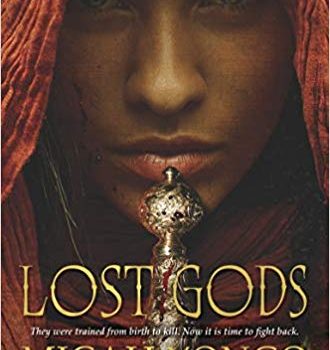Katharine Coldiron Reviews Lost Gods by Micah Yongo
 Lost Gods, Micah Yongo (Angry Robot 978-0-85766-737-3, $12.99, 448pp, pb) July 2018
Lost Gods, Micah Yongo (Angry Robot 978-0-85766-737-3, $12.99, 448pp, pb) July 2018
One of the daunting aspects of epic fantasy is the double duty it must do: it must be a genre novel with its own setting, ideas, and language, and it must be a historical novel, offering a well-thought-out contextual backdrop of nations, epochs, and ruling figures on which to project its characters’ actions. The grandness of this challenge may be why so many writers of epic fantasy have stuck to the European model set up by Tolkien – and why a book like Lost Gods reads as both fresh and a little bit tedious. It totally sidesteps European-influenced epic fantasy for a setting inspired by North Africa, which makes it a bracing read, but its historical-novel aspects must be more prominent than the norm to fully ground a reader accustomed to Tolkien-type epic fantasy.
That’s probably why Lost Gods, despite its significant pleasures, is so dense and difficult to follow. Micah Yongo does not hand-hold his reader, but tells the story of the novel as if it’s a history, not a fiction. The central figure is Neythan, a young man raised in an assassin’s guild and surprised by betrayal and murder when he’s sent out on his first major job. It seems like Nathan is going to build a standard party (rogue, wizard, warrior), but the party keeps breaking and re-forming into new shapes as he gets into increasingly deadly skirmishes with soldiers, other assassins, and men from his past. The guild who trained and raised Nathan are not what they seem, but neither is the precarious kingdom to the north or the stewarded kingdom to the south, both in upheaval; nor is the land’s religion, abandoned long ago but not, as the title claims, fully lost.
The machinations of Lost Gods‘s plot are totally dizzying, entailing multiple betrayals lying within one another like nesting dolls, and the obscure motivations of characters that are sometimes sketched instead of fleshed out. The cast of characters is so unwieldy that, for example, keeping track of which old woman is the wise one, which is the healing one, and which is the evil one proves impossible. Few of these characters feel truly unique; the characters spend a lot of page space telling Neythan who he is, rather than the book demonstrating his character via action and reaction. The book is long, and somewhat prone to descriptions of food, people, and geographical areas that don’t really require description to establish character or move the plot forward. Because of all this, it’s not a book that grabs the reader immediately.
Once I got about halfway in, I found it easy to become immersed in Yongo’s universe. The intricate plot more evidently hooked together, like a lace pattern, rather than the several disconnected chains of stitches it seemed to be earlier. The writing is confident and guileless, and the world is convincing in its wholeness. Plus, the (many) action scenes are dynamic and sharp with detail.
Neythan turned to parry a sword from behind. Clang of metal. Swords locked. The blade bit at Neythan’s shoulder and drew blood. Neythan threw an elbow, freed an arm, then followed with a kick to the gut. He watched the man stagger back and hit the well’s ledge, legs and feet kicking upwards at the impact as he fell heels up and headlong into the hole.
The book also has a habit of offering its world’s wisdom in frequent, piquant aphorisms, such as: “A thing is not unclean because of what it is. It is unclean because of where it is.” Or: “There is no greater folly in a man than for his heart to be lifted in pride, and there is no greater weakness in him than to depart from the way of his ancestors.” Or: “Why should sparrows expect to understand the ambitions of a swan?” Words like this are grand and memorable, but too many of them stuffed in a single book feels a bit like reading the Bible instead of a novel. Perhaps Yongo crosses that line, but perhaps not. The loftiness of the book’s intentions is part of its atmosphere, which eventually becomes heady and addictive.
It’s plain that Lost Gods is only the beginning for this series. Neythan’s most faithful companion, Caleb, clearly has more to his story than is told. A secondary plot involving the intrepid wife of a nobleman trails off toward a new quest rather than closing down. Something supernatural and upsetting happens to Neythan in the book’s final pages, and it’s the kind of event that, say, a Dragonlance story could spin out across multiple books. But a Dragonlance story wouldn’t have such excitingly unusual settings, traditions, and manners of speech. For a book that does unfortunately drag sometimes – particularly when fulfilling its duties as a semi-historical novel – it’s an invigorating work of fantasy, and an intriguing start to a new series.
Katharine Coldiron is the author of Ceremonials (Kernpunkt Press), an SPD fiction bestseller. Her work as a book critic has appeared in The Washington Post, The Believer, The Guardian, and many other places. She lives in California and at kcoldiron.com.
This review and more like it in the February 2019 issue of Locus.
 While you are here, please take a moment to support Locus with a one-time or recurring donation. We rely on reader donations to keep the magazine and site going, and would like to keep the site paywall free, but WE NEED YOUR FINANCIAL SUPPORT to continue quality coverage of the science fiction and fantasy field.
While you are here, please take a moment to support Locus with a one-time or recurring donation. We rely on reader donations to keep the magazine and site going, and would like to keep the site paywall free, but WE NEED YOUR FINANCIAL SUPPORT to continue quality coverage of the science fiction and fantasy field.







